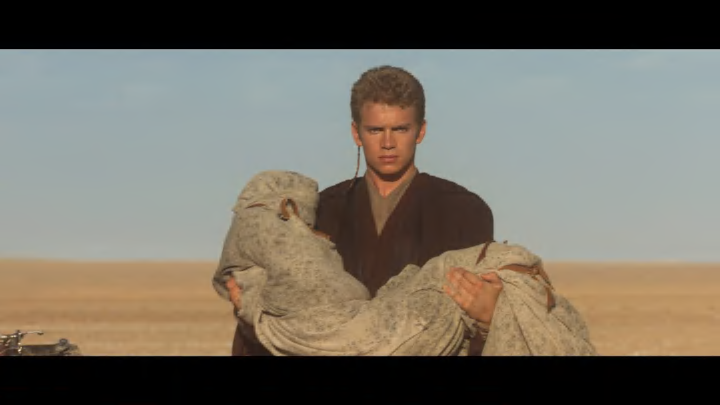Star Wars: Episode II - Attack of the Clones has never been taken seriously and usually lands at the bottom of everyone's ranking of all the movies.
Episode II is heavily criticized for George Lucas' clunky dialogue, reliance on VFX, and Hayden Christensen's portrayal of an emotionally unstable 19-year-old Jedi Padawan, Anakin Skywalker. This movie was Christensen's entry into Star Wars, and he was always judged as the actor portraying a character who would become Darth Vader instead of the man he was before he became Vader. It was a completely convoluted way to view Christensen's performance. Lucas intended to show how and where things went wrong for Anakin and that underneath the cool Darth Vader suit, he was once a guy who loved too much.
George Lucas showed us the essence of Anakin as a human being and why he never made it as a Jedi during an underrated part of Episode II when he returns to his native home of Tatooine. This part of the movie is integral to Anakin's life and his downfall, perhaps more than anything else that happened to him. His discovery of the truth behind his nightmares changes what being a Jedi means to him and how he views what the Jedi stand for.

Lucas sets up this tragic arc early in Episode II through Anakin's nightmares about his mother's condition. However, despite how tormented he is by them, he's never allowed to do anything about it. He discusses his nightmares with Obi-Wan Kenobi and Padme Amidala, and Obi-Wan tells him that dreams "pass in time." Unfortunately, Anakin's dreams don't pass, and he has to go against orders to keep Padme safe on Naboo to check on his mother. He discovers that she has a family, including a husband and a stepson, but was taken by the Tuskens over a month ago. It proves Anakin's dreams were a warning that Shmi was in grave danger.
Sadly, the Jedi never allowed Anakin to visit Shmi, which was a mistake that would lead to their destruction. Shmi died in Anakin's arms, and while he got to fulfill his promise of seeing her again, it meant having to lose her forever. The result was an enraged Anakin who took his first steps towards the dark side by slaughtering every man, woman, and child in the Tusken village. He didn't regret it because until then, Anakin had tried his best to be a good Jedi and was tormented by the restrictions on his every move. His subsequent breakdown in front of Padme is fundamental as it reveals that he resents the Jedi for suppressing his emotions, including Obi-Wan, whom he blames for holding him back from becoming the most powerful Jedi ever.
Here, Anakin's obsession with saving the people he loves from dying takes root, and the Jedi are fully responsible for how this all goes down. Had they let Anakin visit Shmi as soon as he began having dreams about her being in danger, perhaps things would've turned out differently. Maybe Anakin would still fall to the dark side, but at least the Jedi wouldn't bear such a huge responsibility for why he ends up so utterly broken and devastated.

George Lucas showed us how any 19-year-old who's been controlled and suffocated his entire life would react in this situation. Anakin was never able to come to terms with leaving Shmi helpless. When it came time to save someone who meant the world to him, he was powerless and, in fact, was discouraged from doing anything about it. That's inhumane, and at this moment, even after he massacred the Tusken, Anakin was his most human. His love for his mother and the need to protect her, or anyone he cares about, is completely normal and human. Unfortunately, the Jedi made him feel that it was wrong to want to protect the people he loved.
George Lucas showed how powerless Anakin felt and how much he regretted following Jedi rules. Lucas did justice to Anakin the Jedi and laid the foundations for his tragic fall, which now seemed completely justified and believable. Anakin's trip to Tatooine was storytelling at its best, and I haven't found any valid reason why this section of the movie is so underrated. Hayden Christensen is brilliant at expressing suppressed anger, frustration, devastation, rage, and complete heartbreak.
It's clear that when Anakin buries Shmi, he's profoundly changed from the person he was before her death. It's the end of Anakin's faith in the Jedi, and that disillusionment with whatever he was taught shows through Hayden's performance. It's an accurate portrayal of grief at its various stages. Anakin's promise to Shmi that he'll never let anyone he loves die again is his way of coping with his regrets but also his undoing.
It's obvious that after this, Anakin might return to the life of a Jedi, but he'll never believe in the path again. His trust has been completely broken, and somewhere, he realizes that there's something fundamentally wrong and inhumane about the Jedi way. Through this underrated part of Episode II - Attack of the Clones, Lucas justifies Anakin's disillusionment with the Jedi and his downfall, which Hayden Christensen portrays brilliantly.
Everyone should put down the prequel memes for a moment and re-watch Attack of the Clones because there's so much more to this movie than Anakin's dislike of sand and the rushed romance between him and Padme.
Star Wars: Episode II - Attack of the Clones is streaming on Disney+.
